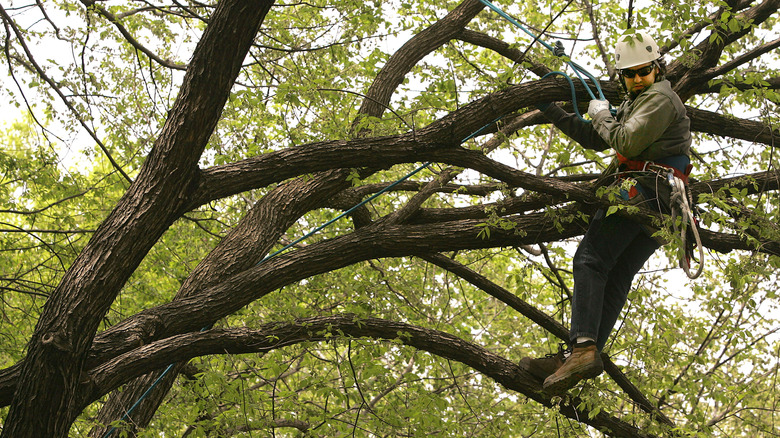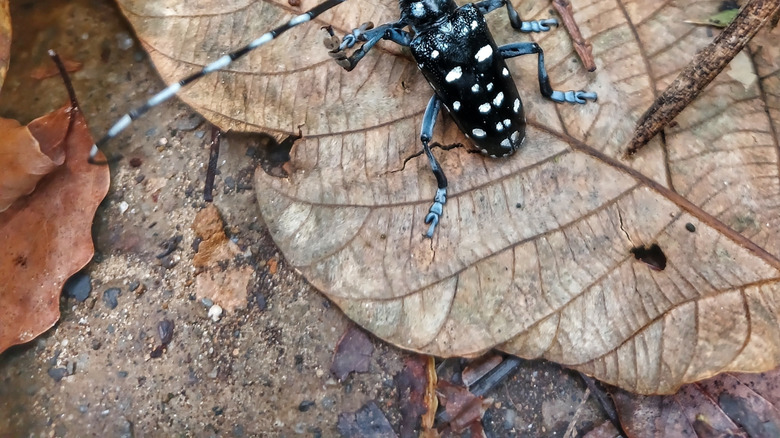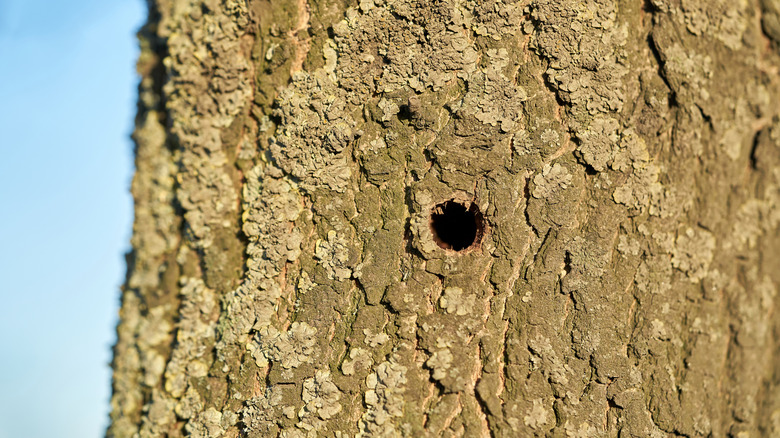The Search For This Invasive Species Before It Destroys The Forest Is 'Like An Easter Egg Hunt'
You are outside walking near some beautiful, tall trees. Suddenly, a large branch drops to the ground. You assume it may have been weakened and damaged during a storm. However, the culprit may actually be much smaller and perhaps pose even more of a danger to the forest.
The culprit is the Asian longhorned beetle. These beetles are small in size and characterized by a black body with white spots. Their antennae are longer than their bodies, and they have six legs. As the name implies, these beetles are not native to the United States. This invasive species has already left its mark by destroying the forests it moves into.
Although the discovery of some insects, such as a rare insect thought to be long extinct, is exciting, uncovering the Asian longhorned beetle in a forest is a call to arms. Efforts have been underway for years to stop this beetle, including local volunteers, state employees, and even federal-level regulations. It is a daunting challenge, but good progress is being made to save the forests from this beetle.
The threat posed by this invasive beetle species
Bugs are some of the oldest pests humans have had to deal with, and the Asian longhorned beetle is no exception. The beetle hopped a ride from Asia to the United States through wood packages prior to the introduction of stringent packaging regulations. It was first found in trees in New York in 1996. It has since spread to surrounding states, including Massachusetts, South Carolina, and Ohio. Locating this beetle is very difficult. Organizations that battle its invasion must search for marks on the trees. These can be coin-sized holes, chewed bark, fallen branches around the tree, and even eggs that have been laid.
Matt Shreiner is part of a statewide effort in Massachusetts to prevent the beetle from invading the forest. He has climbed over 10,000 trees searching for telltale signs of its activity. He told GBH local news, "It's sort of like an Easter egg hunt," and that, "You're looking for damage in the tree. You're looking for something that breaks up the pattern of the bark."
The primary threat posed by the Asian longhorned beetle is that the trees it infests cannot be saved. It focuses on hardwood trees, using them for food and shelter. Its activities greatly weaken the tree, making it susceptible to being toppled by winds. Trees that have an infestation must be completely removed and destroyed. Over time, this has resulted in tens of thousands of trees falling victim to the beetle.
What is being done to stop this invasive species
Worcester County in Massachusetts has had over 8 million trees searched for the beetle since 2008, an effort helmed by the Department of Conservation and Recreation. Trees that are chopped down are carefully moved to the department's facility to try to control the movement of the beetle. It can be an uphill battle, as a single female beetle can lay 90 eggs. Good progress is being made, however, and once-infested towns are now recognized as being completely free of the Asian longhorned beetle.
The Animal and Plant Health Inspection Service (APHIS) is also spearheading efforts to halt the spread of this beetle. Through legal actions and regulations, APHIS has been able to put more rules on the import of wood. International travelers' belongings can also be subject to inspection for the presence of the beetle. APHIS keeps tabs on potential invasion sites and can quarantine an area if the beetle has been spotted. It takes a minimum of 4 years between the time a beetle is first reported and APHIS officially acknowledging the area to be free from the beetle.
Though China may be mass-producing cyborg cockroaches, this Asian bug, at least, is getting under control. Workers who search for and combat this beetle, such as Cecily Isenberg, are hopeful about the future of the forest and the eventual eradication of this invasive species. She told GBH local news, "It's pretty hard to eradicate any insect," and that "The fact that we've basically eradicated this one is pretty amazing."


